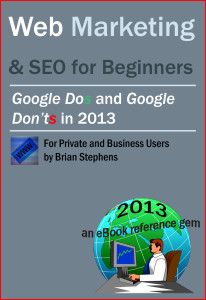So easy to overlook, the words (the copy), as you design your website. Astute businesspeople know that, no matter how graphically enticing their website may look, if the copy is illiterate, waffly, or just ill-considered they don’t work. Match a good-looking site with powerful copy, however, and your message can be worldwide in minutes, communicating succinctly.

Courtesy of PhotoXpress.com
The tail has been wagging the dog for decades in Geekland. Most people nowadays own a computer that has sufficient fire-power to run a multi-national enterprise. Yet many people, too, find difficulty in doing much more than send the occasional email or look up the odd thing on Google. The honest among us own up to this; in commerce, most businesses are equally ignorant about the hold their computers exert over their enterprises and spend fortunes hiring experts to keep the damn things in check.
Websites, too, can bamboozle businesses. But that needn’t happen. Here are my tips to ensure you get value for money from your website investment. I pose the questions; you come up with the answers – then your website can be a site that knocks your competitors out of the ring.
What is the prime purpose of your website?
1. to act as a ‘visiting card’ – a list of people, addresses and contact points
2. an opportunity to describe who a person is, what they do; what a business is, what it does
3. to act as an advert for a person, service or product. The aim, to solicit enquires, or, . . .
4. to enable sales to be made instantly, off the webpage
Are you used to making words work for a living?
Copywriting is a skill, acquired over years, and requires not only a facility with words, but also an ability to communicate messages that motivate readers to act. For items 1 & 2 above, the descriptions required are not taxing. There’s not much scope for using words carelessly and creating the wrong impression. Items 3 & 4, however, require both copywriting ability and a knowledge of the market you intend to work within. Every word on the website will either work for you, or against you.
Will it be cost-efficient for you to seek sales via your website?
Website marketing can be inexpensive; an excellent source of sales. But costs can outrun profits unless you know how to construct your advertising copy – these important words again!
To summarise: a professional website designer will need great copy in order to convey your message in words and graphics. Getting the words right will take time, but will reap rewards. Remember, the graphics are the instant appeal, the words are the motivators. It’s prudent not to take them for granted.
If you really don’t think you can handle the copy then get in touch, outline what you are looking for and I can put you in touch with someone who can help you out at a reasonable cost.





